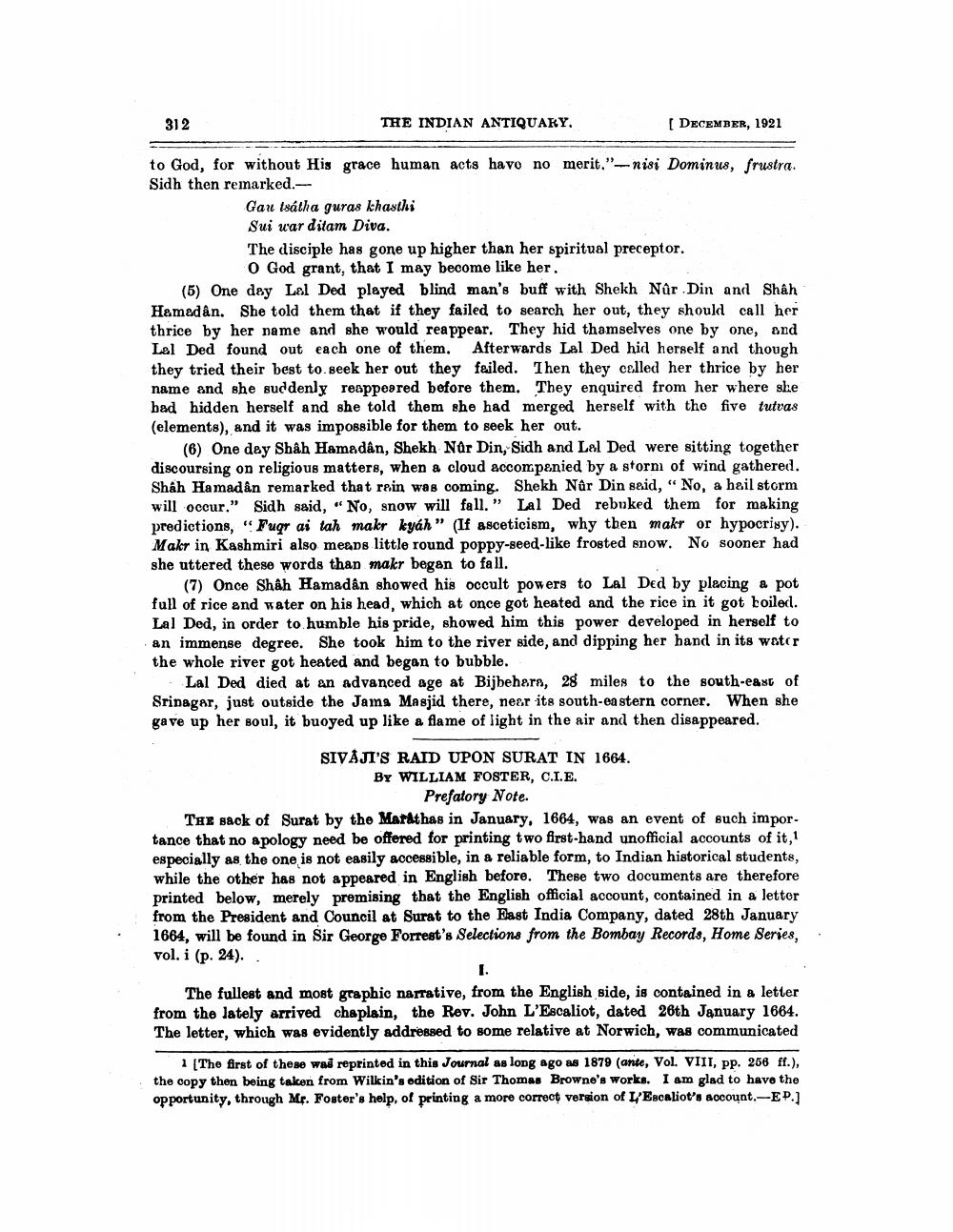________________
312
THE INDIAN ANTIQUARY.
[DECEMBER, 1921
to God, for without His grace human acts have no merit."-nisi Dominus, frustra. Sidh then remarked.-
Gau tsátha guras khasthi
Sui war ditam Diva.
The disciple has gone up higher than her spiritual preceptor.
O God grant, that I may become like her.
(5) One day Lal Ded played blind man's buff with Shekh Nûr Din and Shah Hamadân. She told them that if they failed to search her out, they should call her thrice by her name and she would reappear. They hid themselves one by one, and Lal Ded found out each one of them. Afterwards Lal Ded hid herself and though they tried their best to seek her out they failed. Then they called her thrice by her name and she suddenly reappeared before them. They enquired from her where she had hidden herself and she told them she had merged herself with the five tutvas (elements), and it was impossible for them to seek her out.
(6) One day Shâh Hamadân, Shekh Nûr Din, Sidh and Lal Ded were sitting together discoursing on religious matters, when a cloud accompanied by a storm of wind gathered. Shah Hamadân remarked that rein was coming. Shekh Nûr Din said, "No, a hail storm will occur." Sidh said, "No, snow will fall." Lal Ded rebuked them for making predictions, "Fugr ai tah makr kyáh" (If asceticism, why then makr or hypocrisy). Makr in Kashmiri also means little round poppy-seed-like frosted snow. No sooner had she uttered these words than makr began to fall.
(7) Once Shah Hamadân showed his occult powers to Lal Ded by placing a pot full of rice and water on his head, which at once got heated and the rice in it got boiled. Lal Ded, in order to humble his pride, showed him this power developed in herself to an immense degree. She took him to the river side, and dipping her hand in its water the whole river got heated and began to bubble.
Lal Ded died at an advanced age at Bijbehara, 28 miles to the south-east of Srinagar, just outside the Jama Masjid there, near its south-eastern corner. When she gave up her soul, it buoyed up like a flame of light in the air and then disappeared.
SIVAJI'S RAID UPON SURAT IN 1664. BY WILLIAM FOSTER, C.I.E. Prefatory Note.
THE sack of Surat by the Marathas in January, 1664, was an event of such importance that no apology need be offered for printing two first-hand unofficial accounts of it,1 especially as the one is not easily accessible, in a reliable form, to Indian historical students, while the other has not appeared in English before. These two documents are therefore printed below, merely premising that the English official account, contained in a letter from the President and Council at Surat to the East India Company, dated 28th January 1664, will be found in Sir George Forrest's Selections from the Bombay Records, Home Series, vol. i (p. 24)..
1.
The fullest and most graphic narrative, from the English side, is contained in a letter from the lately arrived chaplain, the Rev. John L'Escaliot, dated 26th January 1664. The letter, which was evidently addressed to some relative at Norwich, was communicated
1 [The first of these was reprinted in this Journal as long ago as 1879 (ante, Vol. VIII, pp. 256 ff.), the copy then being taken from Wilkin's edition of Sir Thomas Browne's works. I am glad to have the opportunity, through Mr. Foster's help, of printing a more correct version of L'Escaliot's account.-EP.]




